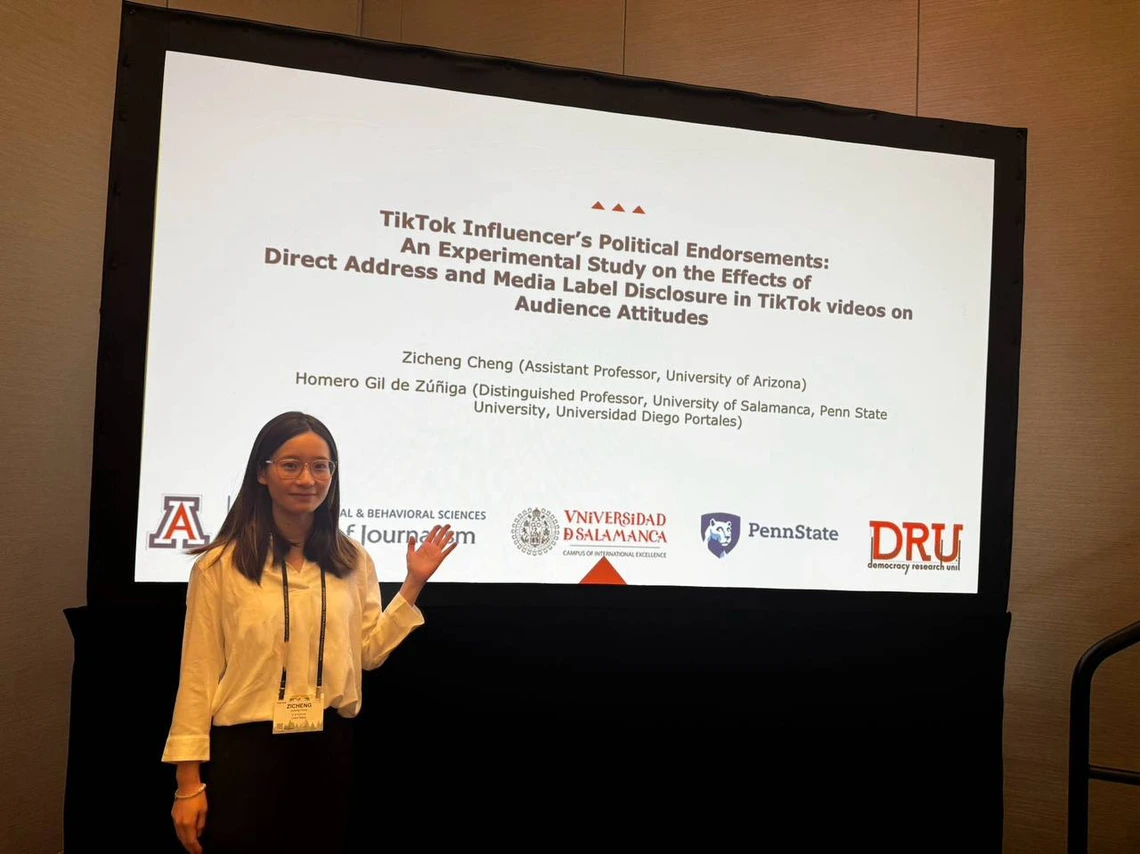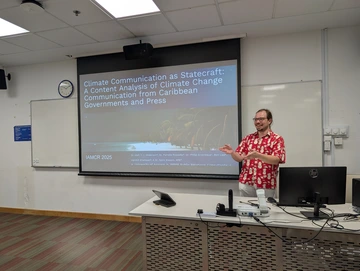SoJ Faculty Dive into Summer Research Around the Globe

Assistant Professor Zicheng Cheng presents research at the International Communication Association conference held in June in Denver, CO.
From Singapore to San Francisco, faculty from the University of Arizona School of Journalism spent the summer presenting research on the future of journalism at major conferences around the world.
Examining Digital Audiences
Dr. Zicheng Cheng co-authored a study that analyzed 16 million TikTok videos. According to the study, politically passionate users are more likely to post political content, reinforcing “echo chambers” on the popular app. These findings were featured in The Conversation, offering a breakdown of how TikTok might be contributing to political polarization.
“My research opens up conversations about how students can become more thoughtful media consumers,” Cheng said. “It also helps them think about how, as future journalists and media professionals, they can contribute to building journalism that is not only engaging but also responsible.”
Cheng also contributed to research that earned her and her colleagues a first-place faculty paper award from the Association for Education in Journalism and Mass Communication’s (AEJMC) Political Communication Division. The paper studied how news consumers may be negatively affected by the belief that they don't need to actively seek news because they’ll stay informed through social media, friends or algorithms.
She also presented findings at the annual International Communication Association (ICA) conference, where she shared research on how TikTok influencers sway political opinions and chaired a session on trust in political systems.
Cheng also teamed up with Dr. Monica Chadha to study how TikTok users consume and learn from news videos. They will present their work at the AEJMC annual conference in San Francisco, California, on Aug. 8.
As more newsrooms shift their attention to newsletters and other digital formats, Chadha is studying what makes newsletters engaging and what makes readers stick around. She will present her research on this topic, “Position, passion and press: How serial position sentiment intensity and news topic impact newsletter engagement,” at AEJMC.
And related to news engagement in social spaces, Dr. Jan Lauren Boyles — who joined the School of Journalism as director this summer — co-authored a forthcoming book chapter on disinformation and misinformation that investigates how evolving fact-checking practices may interplay with the quality of information users see on social media. The project is co-authored by her colleagues from Digital Journalism, the top-ranked academic journal for which Boyles serves as an associate editor.
Modernizing Journalism Education

Assistant Professor Josh Anderson gives a presentation at the International Association for Media and Communication Research conference held in July in Singapore.
Dr. Josh Anderson is also presenting at AEJMC’s annual conference. His work explores how AI tools like ChatGPT might ethically be used in the classroom to teach journalism. Anderson’s work on that topic earned him a paper award from the International Communication Association’s (ICA) Political Communication Division. As AI technology rapidly evolves, Anderson’s research can help provide educators and students with a practical framework for how to use it responsibly.
Boyles co-chaired a AEJMC presidential task force focused on strengthening undergraduate journalism research and identifying ways to provide students with more resources and access to professional research settings. The task force shared its final report with AEJMC’s Board of Directors in August.
Covering Global Issues and Politics
Anderson also presented on climate change communication at the annual meeting of the International Association for Media and Communication Research (IAMCR) in Singapore and spoke on four panels at ICA on topics ranging from science journalism burnout to presidential campaign strategies seen in 2024.
Anderson, who teaches science communication and environmental journalism courses, says he relies on his research to demonstrate to students how people can use journalistic skills to share science information, even if they aren’t working as journalists.
Dr. Jessica Retis also presented at ICA and IAMCR, with research focused on topics including Latin American migration, bilingual journalism and cross-border collaborations in the U.S.-Mexico borderlands — all areas of study in the School of Journalism’s Bilingual Journalism Program.
Retis’s co-authored work about Spanish-language news outlets using messaging apps to connect with audiences won a top research paper award from the Latin American Studies Association. She will also receive AEJMC’s Lionel C. Barrow Jr. Award at the organization’s conference in August.
Earlier this summer, Dr. Susan E. Swanberg participated in a special panel marking the 80th anniversary of the atomic bombing of Hiroshima at the International Association for Literary Journalism Studies conference in New York. Swanberg, who teaches courses on scientific misinformation and environmental journalism, revisited an eyewitness account from the bombing dropped and reflected on early coverage of nuclear warfare during the panel.
Dr. Jeannine Relly and Chadha co-authored a new study, set to be published in Journalism and Communication Monographs, which explores how media entrepreneurs adapt and grow during times of war and repression.
Relly is also part of a team studying the uncertainty and dangers experienced by journalists in Costa Rica, a country once known for its protections for the press. Their findings, based on interviews with and surveys of more than 250 journalists, will be presented at the upcoming AEJMC conference.
The work by Relly and her colleagues received a Latin American Research Award from AEJMC’s International Communication Division and is part of the Worlds of Journalism Study, a 75-country project that examined journalists’ safety and independence.
Relly will also present at the World Journalism Education Congress in San Francisco, where she’ll share insights on trauma-informed reporting and the challenges faced by journalists working in conflict zones.
“Taken together, our faculty are incredibly productive in the most respected research spaces in our field,” said Boyles, the School’s director. “At the same time, these contributions help strengthen the lessons that our tenure-track professors bring back to the classroom. Because of these dedicated contributions, our School is raising its research profile nationally and internationally.”

